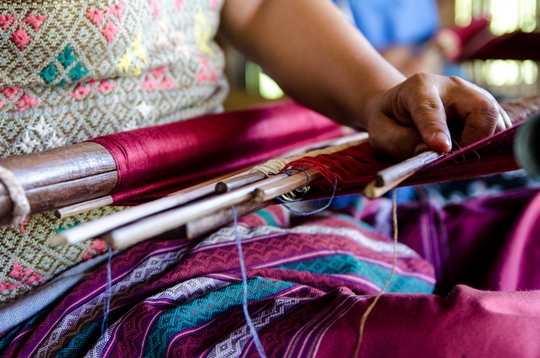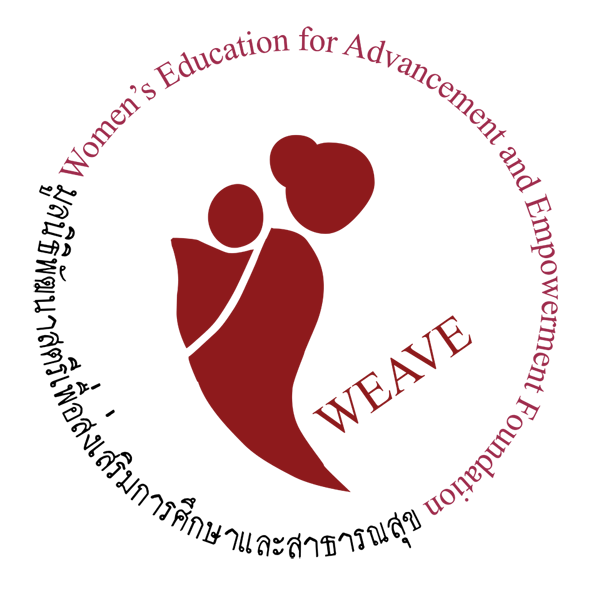
7:45am, it is time to meet Mitos Urgel, the executive director of WEAVE: we have a busy day ahead of us. With her traditional hat and embroidered shoes, we can’t be wrong! Soon we meet the staff that will accompany us during our visit: Tonette Guillermo, the managing director, Cynthia Law and Kawkaw, assistant director for production and production officer (and translators at the same time), and Sombat, the driver. The visit of that day is a particular visit, as it actually takes place in a Karen refugee camp near Mae Sod, at the border between Thailand and Burma. The purpose of the organization is, to cite their website , “to empower indigenous women and support their needs and basic human rights”. While we are heading to the camp, our discussion with the staff allows us to understand better the context of this place, which is more than crucial.
The point is, it is impossible to understand the role and significance of WEAVE without understating its context of creation and its context of action.
WEAVE, which stands as an acronym for Women’s Education for Advancement and Empowerment, was founded in 1990. In other words, two years after the student revolution in Burma, when displacement issues starting to become a real problem in Thailand.
There are currently about 20 International Organizations and NGOs based in Mae Sod. One noteworthy fact is that the NGOs are the one taking the lead in terms of humanitarian aid in the region, the UNHCR (United Nations High Commission on Refugee) being not entitled to fulfill its mandate as Thailand is not party to the 1951 Refugee Convention. The situation relative to Burma (official name: the Republic of the Union of Myanmar) merits a few words of clarification:
First of all, the name: we noticed that the staff was using “Burma”, and not “Myanmar”. Both actually mean the same thing, but there is political meaning behind the words. When the military junta took the power in 1989, they decided to change the name without consulting the people. Using the name “Burma” therefore appears as a form of resistance.
The political and economical landscape in Burma in changing fast in recent years, but the situation is still very fragile. Despite the talks about Burma turning into a democracy, the organizations based in Mae Sot do not feel any concrete change so far. It is certainly an exciting and promising time, but “people have to be patient”. Burma has been isolated for decades and only opened its borders 2 or 3 years ago. The paradigm shift is difficult and takes time to operate.
To be aware of the context at the Thai/Burma border is so important because the refugee situation is fundamentally the bottom line of WEAVE’s activities.
To have an idea of what working in a refugee camp means, Mitos Urgel warns us that “people are literally stuck in the camps, with no tangible perspectives about their future”. If there is no work, the only thing to do is to wait that some organizations will bring food and water. “Where is your dignity there?”. That’s the key word in the end, dignity. True, human beings need to fulfill some vital needs – drinking, eating, sleeping: Living in the refugee camp may provide that. But we should undermine the need to fulfill individual personal aspirations, a much more difficult objective to achieve in this context.
WEAVE faces specific challenges arising from this situation:
– There is no access to market within the camp and in the region
– Everything is contained in the camps themselves
– The organization has to deal with the constraints imposed by the Thai government
– NGOs have to be careful not to break the community’s dynamics
The approach of WEAVE is a practical one. It is very common for NGOs and other International Organizations to give trainings, but it should be noted that these trainings “are not necessarily translated into productive work and are not very useful”. To avoid that pitfall, WEAVE develops concrete projects that allow women to generate income.
WEAVE’s projects are based in 5 Karen and Karenni camps, some close to Mae Sod (1 hour by car) and some more isolated because located upper in the mountains. Interestingly, the women work by themselves and at their own pace, provided they respect the agreement made during the visit of the staff (produce X quantity of X product for that time). On that day, we visited Mae La Karen Refugee camp, where we met one group of weavers, in Kla Tu’s house, and the group in charge of the quality control. The groups are composed of 5 to 8 women, some of them working with WEAVE for several years, some for a few months only.
The women working for WEAVE can make from this activity about 1,500 baht per month (as a comparison, a teacher in the camp earns about 700 Baht). The organization recently agreed to pay them more by piece produced, responding to the request of the weavers themselves. “It seemed fair to us, as they have developed their productivity and creative skills” asserts Tonette Guillermo”. Beyond the income, we are talking of “Women’s empowerment” indeed, as it allow them to develop strong relationships with other women in the camp and to develop their creativity. WEAVE is a very good example of how the principles of Fair trade can be applied in various contexts, as long as you have a dedicated staff ready to overcome the challenges and constraints.
To conclude, it appears that WEAVE made its way slowly but surely, starting as an NGO in the very specific context characteristic of the Thai/Burma border to progressively embrace the universal principles of Fair trade, adapting them to the situation of the Karen women in the refugee camp.
(Original Post by WFTOAsia: http://wfto-asia.com/weave-promoting-fair-trade-activities-in-refugee-camps/)

